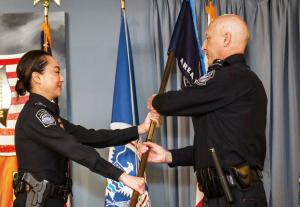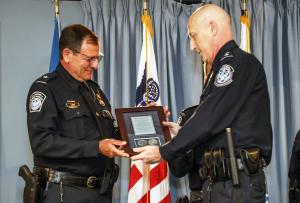Historic transfer of Ports creates a single Chesapeake Bay operations and security region
BALTIMORE – As far as adoptions go, U.S. Customs and Border Protection’s Baltimore Field Office feels they got lucky to add the Area Port of Norfolk-Newport News, Va., to the family.
During a ceremony in the Norfolk Fire-Rescue Training Center auditorium on Friday, CBP’s Atlanta Field Office officially transferred the operational control of the Area Port of Norfolk-Newport News, the Port of Richmond-Petersburg, Va., and the Port of Charleston, W.V. to the Baltimore Field Office.
The move is historic. This is the first time that CBP has transferred any of its 328 port offices across the country from one field office to another field office since the agency’s inception in 2003. In layman’s terms, a field office is a regional headquarters, and the port office is a local business office.
“The CBP employees working tirelessly at the Ports of Norfolk-Newport News, Richmond-Petersburg, and Charleston have successfully served the Atlanta Field Office with distinction for many years and I am absolutely confident that they will carry on that tradition of outstanding service to the Baltimore Field Office,” said Cheryl Davies, Acting CBP Director of Field Operations, Atlanta Field Office.
Following Director Davies’ remarks, she presented the Area Port of Norfolk-Newport News guidon to Stephen Maloney, CBP’s Director of Field Operations, Baltimore Field Office. A guidon is significant in that it represents the unit and the unit commander, and the guidon presentation is a symbolic gesture of the official transfer of authority.
With the guidon secured, Director Maloney offered remarks on accepting the additional ports.
“This is an historic day for Customs and Border Protection because it is the first time that an Area Port is being transferred from one field office to another,” Director Maloney said. “Bringing the Area Port of Norfolk-Newport News under the Baltimore Field Office allows for closer coordination of interagency trade enforcement and security operations within the Chesapeake Bay region. This is also good news for our trade and travel industry stakeholders because a unified approach to CBP inspections under one field office creates greater efficiencies in our communications. This is a great time for international trade and travel growth in the mid-Atlantic region and I am really excited for the bright future that lays ahead for us.”
Director Maloney then presented Area Port Director Mark Laria with a plaque commemorating the Area Port of Norfolk-Newport News’s historic transition to the Baltimore Field Office.
“It has been my distinct pleasure working with the Atlanta Field Office for more than 20 years and I look forward to the transition to the Baltimore Field Office,” Laria said. “As we transition, we will be steadfast in our efforts to keep our communities safe and commerce moving through the ports of the Area Port of Norfolk-Newport News.”
The decision to transition these three ports is geographically and operationally expedient.
Norfolk is 566 miles from Atlanta, but only 233 miles from Baltimore. Richmond and Charleston are also closer to Baltimore.
The Area Port of Norfolk-Newport News conducts trade enforcement and security operations in the Chesapeake Bay region while the Area Port of Baltimore conducts similar operations in the upper Chesapeake Bay region. Bringing Norfolk under the Baltimore Field Office allows for closer coordination of trade enforcement and security operations within this single maritime environment. This inter port synergy allows CBP to help protect our nation’s economic vitality by mitigating any potential inbound threats while they are closer to sea than to our critical commercial port facilities.
Additionally, moving the Baltimore Field Office’s boundary to the Virginia and North Carolina state line closely aligns with the FEMA regions construct, which the federal government uses during natural and man-made disaster responses. During federal emergency declarations, CBP contributes several unique capabilities to disaster responses and contributes numerous law enforcement, medical care, aviation, small boat, and search and rescue resources to supplement state response efforts. Aligning under one authority speeds FEMA resource request decisions that can help save lives.
CBP’s Baltimore Field Office carries out the agency’s critical border security mission while enabling lawful international trade and travel throughout the mid-Atlantic region, which spanned from Southern New Jersey down through Northern Virginia, but now extends to the North Carolina state line. Annually, the Baltimore Field Office processes the admissions of more than six million international passengers and crew aboard commercial, military and private aircraft and vessels, and clears over $100 billion worth of imported commercial goods.
CBP's border security mission is led at ports of entry by CBP officers, Agriculture Specialists, and support personnel from the Office of Field Operations. CBP officers screen international travelers and cargo and search for illicit narcotics, unreported currency, weapons, counterfeit consumer goods, prohibited agriculture, and other illicit products that could potentially harm the American public, U.S. businesses, and our nation’s safety and economic vitality.
Please visit CBP Ports of Entry to learn more about how CBP’s Office of Field Operations secures our nation’s borders.




